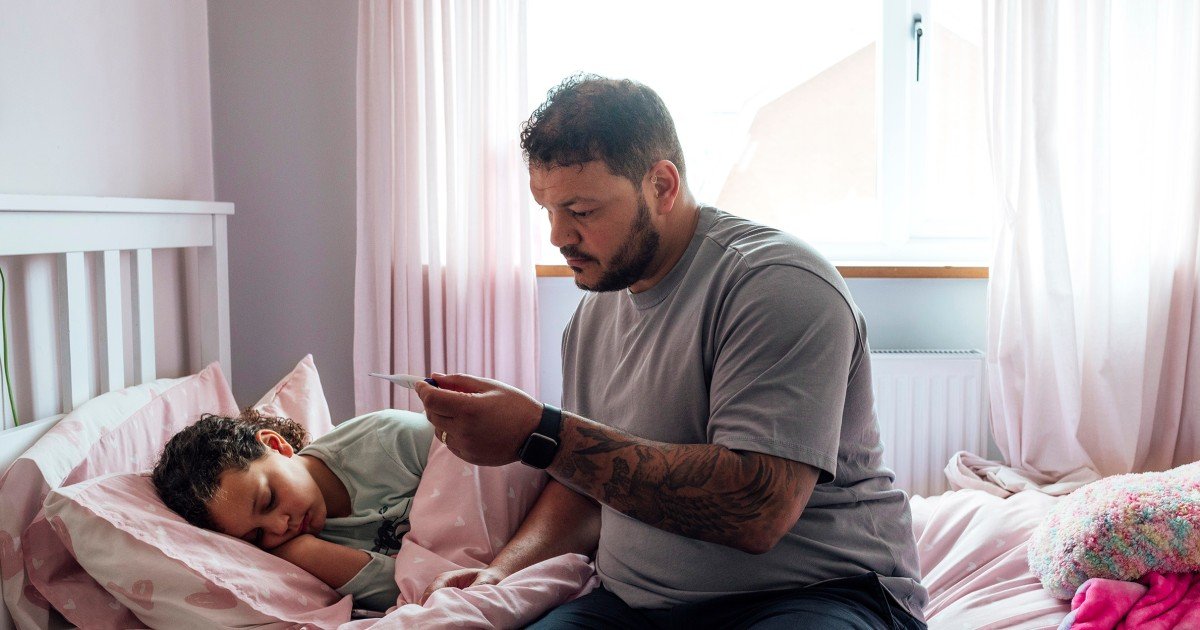Treating childhood fevers has long been a source of distress for parents. Do you feed the fever or starve it? (Spoiler: Kids who are sick need to eat and drink enough to keep their bodies hydrated and well-nourished, doctors say.)
But in September, when President Donald Trump told pregnant women to “fight like hell not to take” Tylenol over unsubstantiated claims that it was linked to autism, the ongoing debate over what has long been considered a standard of care for children’s fever flared up again.
“My friend’s baby (7 months old) had a fever of 101 degrees on Friday night and she texted me: ‘Of course, now I’m afraid to give him Tylenol,’” one Reddit user recently posted.
A person who identified themselves as a healthcare worker posted in a different Reddit thread last month that a patient “brought her baby in with a fever of 103 and said she was too scared to give him acetaminophen.”
The president, who has no medical training, said several times that pregnant women and their children should “suck it up” instead of taking painkillers.
Acetaminophen is the generic name for Tylenol and is an ingredient in a variety of medications. There is no credible data, experts say, to show that fever reducer is unsafe when used correctly. The American Academy of Pediatrics wrote last week that studies do not find a “causal link” between acetaminophen and autism in children or during pregnancy. “Misleading claims that the drug is unsafe and linked to higher rates of autism send a confusing and dangerous message to parents and parents-to-be,” the group wrote.
What’s the point of having a fever?
When a new, potentially harmful germ invades our immune system, the body reacts by raising its core temperature. Viruses and bacteria tend not to thrive in warm environments.
That’s not necessarily a bad thing, within reason, said Dr. Molly O’Shea, a Michigan pediatrician and spokesperson for the American Academy of Pediatrics.
“Fever has value in fighting infections,” he said. “But there is a tipping point at which that value is lost.”
This is when the child feels so uncomfortable that he does not want to eat or drink.
“That’s when it makes sense to reduce the temperature,” he said. “Dehydration can cause more damage.”
Is a high fever always dangerous?
When Seth Creech came down with the flu during the 2009 H1N1 pandemic, when he was 6 years old, his fever soared to 106 degrees Fahrenheit.
It’s a frighteningly high temperature that would make most parents panic.
Seth’s father, Dr. Buddy Creech, a professor of pediatric diseases at Vanderbilt University Medical Center in Nashville, Tennessee, had a different opinion.
“As a pediatrician, I knew 106 wouldn’t hurt him,” he said. “In a normal, healthy child, the body is very well calibrated to keep that temperature in a range that will not be harmful to the child. It’s important for parents to realize that.”
What was troubling, Creech said, was how his son behaved while he was sick. “It looked terrible,” he said. “His eyes were glassy. He didn’t want to move.”
Fever-reducing medications, such as acetaminophen and ibuprofen, brought Seth’s fever down to about 101 degrees. “He was totally fine at the time,” Creech said. “He was gold, he played Legos, video games.”
Seth Creech recovered and is now 22 years old and a college senior.
“If the child looks good and feels good and is playful and active, you really don’t need to do anything,” Buddy Creech said. “You can hold that in part to see how they do and let the fever build up the pressure on the germ to die.”
O’Shea supported the position that a child’s behavior is key in determining how to react to high temperatures. Signs to treat fever include being unusually sleepy, cranky, and refusing food and drinks.
Still, the AAP recommends calling your pediatrician for advice when a child’s fever reaches 104 degrees.
The threshold for babies under 3 months old is much lower, depending on the group, 100.4 degrees.
Creech said there is no evidence that giving children Tylenol or other medications to relieve pain or fever would prolong their illness.
“Parents should feel very safe giving their children Tylenol when they need it,” she said.







